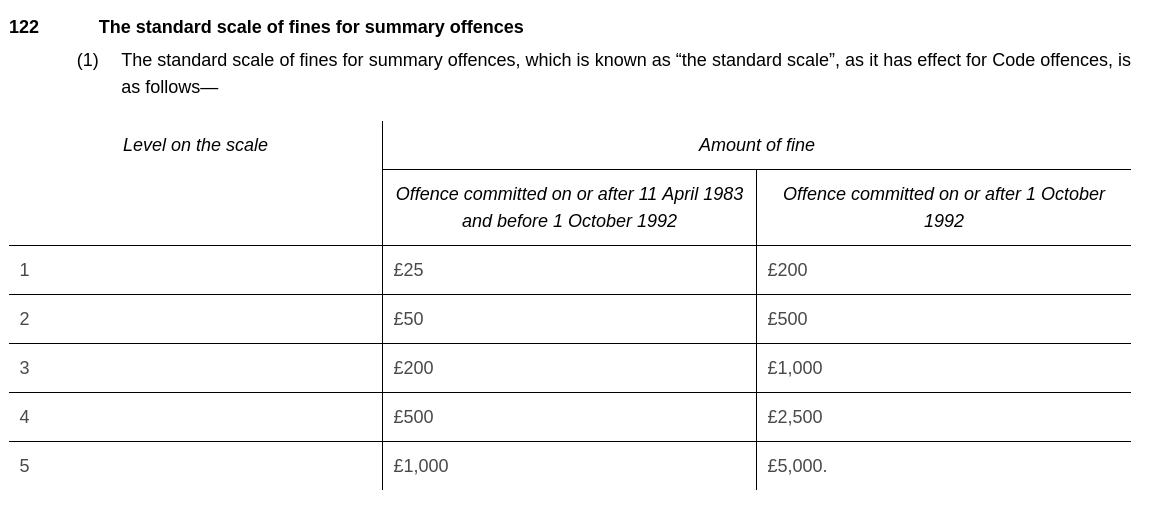
Last week I attended an unofficial discussion group about the future of AI in Government. As well as the crypto-bores who have suddenly pivoted their "expertise" into AI, there were lots of thoughtful suggestions about what AI could do well at a state level. Some of it is trivial - spell check is AI. Some of it is a dystopian hellscape of racist algorithms being confidently incorrect. The…
Continue reading →

The UK has what is known as a "Standard Scale" of fines for criminal acts. For example, breaking the law may incur "a fine not exceeding level 4 on the standard scale". Part of the reasoning behind this, so I understand, is to make it simpler for the Government to update the value of those fines. Rather than having to change every law in the land - and have tedious votes on them - it's possible…
Continue reading →

One of those things that organisations love to do is issue identifiers. My credit card provider issues me with a Customer ID, a Billing ID, a Reference Number, and an online login ID. All of which are different. And none of which match the embossed plastic card they sent me. The state also issues identifiers. I know, I know, I am not a number, I am a free man. But I have a passport number which…
Continue reading →

How do you modernise the technology of a huge organisation like the UK's Ministry of Justice? Kim Rowan has some bright ideas. 🔊 💾 Download this audio file. Read Kim's post on the Application Modernisation Team For more technical posts, read the Just-Tech blog on Medium. …
Continue reading →

(Disclaimer - I currently work for GDS, although I don't work on FOI. This is an opinion piece and doesn't represent the views on any of my employers - past, present, or future.) The Irish government recently complied with a Freedom of Information Act request from journalists at RTÉ. The journalists wanted copies of messages sent via a WhatsApp group. The Irish government complied and sent out …
Continue reading →

Well, it's not often I get to completely influence the UK Government's approach to open standard. GOV.UK is adopting .ODF as their official document standard! All documentation will be also made available in HTML & PDF. Sweet! Yeah, yeah, so I only played a small part in the (no doubt) hideously complicated process - but I'm happy to take full credit :-) Last year, the UK Government opened…
Continue reading →

This is part 4 of a series of blog posts looking at the security of the UK Government's web infrastructure. Over the last few days, I've shown that hundreds of websites run by branches of the UK state are in a perilous state of disrepair. There are multiple sites with hugely embarrassing XSS flaws, running ancient and unsecured software, languishing unmaintained and long since abandoned. What …
Continue reading →

Cyber Security is of vital national importance. As the United Kingdom places more of its infrastructure onto the Internet, bugs and glitches go from minor inconveniences to full scale national emergencies. Suppose, for a moment, that a hacker were to interrupt payment processing for banks, or tamper with the UK's water supply, or cut off the phone lines. The economic damage alone could run…
Continue reading →

The BBC is reporting that the Government is so afraid of prisoners having access to concealed mobile phones, they want to introduce a ban. UK officials are considering banning the sale of small mobile phones designed to resemble car key fobs. A government spokesman told the BBC that it was discussing the issue with the National Trading Standards Board and the Serious Organised Crime Agency. It …
Continue reading →

David Cameron wants to block certain "pornographic" search terms. He joins a long list of MPs who simply don't understand what they're talking about - like Claire Perry, Andy Burnham, and Helen Goodman. I've talked before about my time working as an "Adult Material Classifier" for Vodafone UK. In short, my team and I used to watch pornographic videos and classify whether they were suitable for…
Continue reading →

Another year - another OpenTech! See blog posts from 2010 and 2011. It feels like every year the event gets bigger and better. It's still the same crowd of politically aware techies, and it still costs a ridiculously cheap fiver to come along, and the talks were of an abnormally high quality. Here are my thoughts from the day. Farmification Of Factories Fascinating talk from Lisa Ma about…
Continue reading →

Strolling along London's Southbank the other day, I came across one of those new-fangled information posts. Crudely stuck to it was a decidedly old-fashioned piece of paper bearing a planning notice. But! My my! What's that in the lower left corner? A QR code! Unsurprisingly, scanning the code takes you directly to the planning application on the web. Although the site isn't specifically…
Continue reading →










